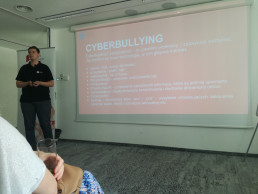Does ladder painting help to build self-confidence?
When your child announces that he does not want to go to a language camp to London, because he prefers to do professional shacks on a bushcraft course in a nearby forest, do not panic. This is a great opportunity to think about how to support your child's development wisely. When to trust? When to intervene?
The child's first interests may seem promising or be a big surprise for parents. They can change, they can be short-lived - it's important that they are. It is a reliable sign that the child has begun looking for his passion, shows initiative, tries to organize time himself.
What does the child get?
A ten-year-old who goes to dream weaving classes brings something more than a piece of hand-woven fabric. Gaining the resources necessary to conduct a satisfying life in the future (and it is not about manual skills at all) - a sense of agency and competence, learning about own abilities and talents, stimulating the imagination, developing social competences in a new peer group, motor development ...
The power of awareness of own limitations
However, there are situations in which the parent's intervention will be beneficial for the child. For example, when a child is unable to objectively assess his or her abilities and wants to invest his time and effort in an activity that is too difficult, it can result in great difficulties, humiliation and even permanently discourage him from taking any action. It is not about directing children towards areas where they will certainly achieve success without any problems. Well-chosen activity for a child is one in which it must face challenges, but it also has a real chance to achieve its goals.
Trust!
The offer of activities for children is very rich today - especially in big cities it is difficult to decide what will be the most developmental and useful for a child. Asking the child what he wants, does not always end up participating in well-chosen activities - children often do not know what the classes are about. So, let's give your child space to experiment at home and let them try different activities. Declared interests of the child are an expression of his needs, but to find them, he often must first realize them. Before you categorically refuse to finance the course of making bas-reliefs in wood, think about whether it is not worth trusting your child.
Foundation Intelligent Technologies 4th birthday
Today, we celebrate birthday of our Foundation. In the past year, we continued conducting workshops for children and youth "Intelligent in the Web" regarding Internet security and proper use of new technologies. We took part in the celebration of the Safer Internet Day and in the 23rd Science Picnic of the Polish Radio and the Copernicus Science Center. We also conducted workshops for parents regarding cybersecurity under #expertTalk together with myhive.
We are constantly working on the development of the Im2be application to provide "Hopeful People Technology".
Thank you to all those who support our activities. Next years of hard work ahead of us!
Selection of toys and their impact on children’s development
Toys piled on shelves in children's rooms, multicolored attractions with different textures, sizes and applications. Games, puzzles, robots, ovens, blocks, dolls and controlled cars - to choose from. All these components are associated with the activity loved by children - a play that develops them at this stage in a perfect and irreplaceable way. Proper psychomotor development of the child is associated with the correct selection of toys for him. Are we suggesting this conviction by reaching for the toy to the joy of our child?
An integral part of life of a child under 6 is mainly fun, during which he discovers the world. Play cannot be replaced by any other activity at this stage. It is as if inscribed in the carefree years of childhood. Through play children learn new skills, develop small and large motor skills, learn social roles and establish peer relationships. Play has a multidimensional effect on the child's development, affects its physical development, supporting muscle development, manual fitness and coordination. On the level of social development, he teaches specific forms of behavior and roles, cooperation, sharing and friendship. In the end, the game ultimately influences the cognitive development of the child, which means that it provides knowledge about colors, shapes, textures and knowledge about the world.
Toys are a fun tool and define this activity, so it is worth considering their selection. Too many toys cause that the child cannot concentrate and use them properly in their activity. Excessive amount will also cause that the child will not enjoy the fun, which is the main activity for him. As the University of Toledo, Ohio, USA study shows, the excessive number of toys in a child's room significantly weakens his concentration and attention. Scientists from Ohio invited children to two rooms to play, one of them had a dozen different toys, in the other there were none. Play activity of children differed significantly from each other, in the first room the games were very short-lived, they were shallow and there were conflicts. The children's games in the room without toys were creative, based on cooperation and full commitment.
The first thing in choosing toys is their safety, in turn adjusting to the age of the child. It is worth it to affect all the senses of the child, with its color, shape and texture, but it did not bombard with sound, visual or tactile stimulation in a too intense way. Toy can affect the child's motor development, the development of manual or artistic skills, depending on his or her destiny. An interesting proposition are construction toys that teach technical skills, assembly, disassembly, manipulation, which are invaluable in everyday life. The principle is less and more reliable when buying toys. Instead of buying ten small cars of poor quality, which in a few days will lose the chassis, buy one solid vehicle that will not only serve the child to play, but it will not break down in a short time. The child is a creator of ideas for their fun, toys to help him. If there are too many of them, the child's fantasy will expire.
Most parents have certainly witnessed great ideas for children when we provide them with an ordinary cardboard carton that will generate millions of ideas with simplicity. After few minutes, a spaceship, a drinks shop, a dollhouse, or a fire engine can be built out of the ordinary gray box. And that's it - let the kids create their toys, it's a very creative and innovative experience that will not only provide a lot of fun, but will also result in a child's creative, innovative thought in the future. Cosmetics boxes are an interesting material for construction, manual and plastic games. What's more, they can be used in all of these ways and effectively develop creativity.
The child's interests and preferences are one of the factors influencing the selection and purchase of toys. Especially if we are talking about older children. They, often manipulated by advertising, want to own a full collection of blocks, dolls or controlled cars. Developing your interests, caring your preferences and love for them is natural and it is worth using them wisely. A favorite character from a cartoon does not have to condition the purchase of a full range of toys with his image. This is a character that encourages the child to read, paint, build and move.
In order to refresh and dose joys of the toys held by a child, they can be periodically put down and replaced with those that have already been treated, remembering that there should be very few of them. This is a good solution, especially when a child receives some new toys on the occasion of a ceremony and automatically loses interest in the old ones. Do not do it against your child, if he knows that the toys are in a safe place and can return to them, he will accept the idea.
Toys are the greatest joy of childhood; we remember them, and we remember them for a long time. We choose them wisely and with care, not exaggerating with their quantity and not following fashion. Let us sometimes have fun together with the child, then we will find out which toys develop the most.And what toy do you remember from your childhood? Maybe it's worth searching in the attic of mother or grandmother to get back to the memories together with the child.
Bibliography:
Zabawy badawcze dzieci w przedszkolu, WN WSP Kraków 1992, ss.194. Czaja-Chudyba, I. (2006). Pedagogika zabawy w osobowym i profesjonalnym przygotowaniu do zawodu nauczyciela. Kraków: Wydawnictwo Naukowe AP. ISBN 8-7271-381-2.
100x100 meeting cycle
On 28th of June we took part in event held at the Warsaw Stock Exchange, organized by the Polish National Foundation within 100x100 meeting cycle. The event consisted of 3 elements:
- Presentation of exceptional technological companies (including www.syntoil.pl, www.skriware.com, www.flytechuav.com/, www.triggo.pl/, www.satrevolution.com/)
- Tim Rowe’s presentation on building strong innovative ecosystems.
3. Networking session/catering/ artistic elements (the works of Janusz Kapusta, New York City-based discoverer of a new geometric shape, patented in the US http://januszkapusta.com, awarded multiple times
#ekspertTalk
On July 2, at Crown Point, the last meeting of the #ekspertTalk series concerning Internet security took place. Each meeting was an inspiring experience. We are happy that all of you liked the topics covered. During our meetings, most parents said that one hour is not enough for them, they want more! So? We will try to meet the expectations of parents. Be sure to watch us! More details soon ...
The principles of good habits for children and adults
Habit is an activity that we undertake without hesitation and very regularly. It is often done without specific awareness and wasting cognitive resources. It is important for children to develop good habits in every possible area of life.
In the development of appropriate habits in children, or in adults, we are helped by behavioral and cognitive-behavioral psychology. Both of them possessing huge achievements of empirical research distinguished six basic principles facilitating the development of specific habits. The individual steps are presented below.
- Make decision! At this point, it is important that this decision is conscious and personal. Therefore, before you force your child to work out some habits, motivate them to make the decision that they want to do it! For example, a child decides to read 10 pages of a book every day.
- Do not allow for exception! It is important not to allow situations when I give up an activity that is to become my habit. Of course, it should be approached with a great distance, e.g. if you have already failed to do the action, do not resign altogether just go back to shaping the habit the next day. For example, I try to eat healthy. After a month of proper nutrition, I happened to eat something unhealthy. Instead of giving up my sacrifices, I return to proper nutrition from the next day.
- Tell others! When we talk about what we want to achieve to other people, the given task is gaining a different, greater involvement for us.
- Visualization of yourself doing the habit! Try to imagine yourself doing the given activity. In this way you strengthen a given activity and transform it into a habit.
- Create affirmation! Find positive aspects of the habit you want to work out in yourself. Repeat for yourself what you gain by doing something. Affirmation should be short and always performed by the person who acquires the habit - it makes them more motivating.
- Reward yourself! The prize is very important. It has the greatest impact on the development of good habits and strengthening motivation, especially when the main goal is distant in time. When you apply the rules mentioned above, you will succeed in developing the same habits you want to have. They can be about different issues, i.e.healthy eating, hygiene, sleep, daily exercise, etc. It all depends on you.




